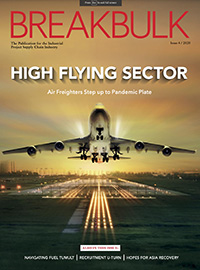Breakbulk: Belt & Road Initiative To Drive Global Exports And Create Opportunities To Exploit The Infrastructure
New Issue of Breakbulk Magazine Includes 2021 BRI Project Cargo Analysis
Speaking to the influential Breakbulk Magazine, which deals with global Project Cargo issues, Chris Devonshire-Ellis, chairman of Dezan Shira & Associates, believes that now is the right time to look at auxiliary requirements related to the BRI and the project cargo work associated with those. His company specializes in handling foreign investment into Asia and China’s BRI.
“A lot of the infrastructure build that China is involved with other foreign governments is already underway. In fact there is a backlog of projects to complete, with some under construction and some, such as the Budapest-Belgrade rail, having just had the financing agreed.”
While critics might suggest that there is a BRI slowdown taking place or that China has run out of cash, Devonshire-Ellis sees the current phase of the BRI as just the natural cycle of project implementation to completion. Investors, he adds, should be closely studying what infrastructure build is taking place where and what additional facilities will be required on top of the basic facilities. That will include warehousing, cold storage, distribution, repackaging, relabeling, and all other component parts of the logistics software on top of the new infrastructure.
“Putting in the research and learning where those are will uncover multiple investment opportunities,” he said.
That analysis is supported by Werner Pascha, Chair of East Asian Economic Studies/ Japan and Korea at the Mercator School of Management, part of the Institute of East Asian Studies at the University of Duisburg-Essen, who feels that the BRI certainly has the potential to drive a degree of economic activity in the Asian region, serving as a facilitator of trade.
“One motive behind the BRI, but also Japan’s similar effort, was and is infrastructure export,” he said. “It will be important to watch who profits from the direct trade effects during infrastructure construction and the trade in services, during the operation phase.”
As the BRI expands, those transporting breakbulk and project cargo will continue to be involved with the construction as well as the transport of the equipment and materials required. “As for the benefits derived from this complex involvement, much depends on the types of contracts being used. Infrastructure projects are notoriously complex, so adequate contracts are extremely important to distribute the potential profits, costs, duties and risks. Potential partners also need legal advice in order to benefit from the involvement.” Pascha stated.
 The current issue of Breakbulk, which deals with cargo assessments for 2021 and the impact of Covid-19 on supply chains, can be downloaded here
The current issue of Breakbulk, which deals with cargo assessments for 2021 and the impact of Covid-19 on supply chains, can be downloaded here
About Us
Silk Road Briefing is written by Dezan Shira & Associates. The firm has 28 offices throughout Asia, and assists foreign investors into the region. For strategic advisory and business intelligence issues please contact the firm at silkroad@dezshira.com or visit www.dezshira.com





